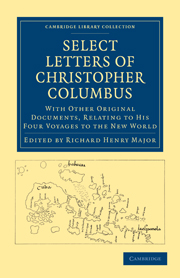 Select Letters of Christopher Columbus
Select Letters of Christopher Columbus INTRODUCTION
Published online by Cambridge University Press: 05 March 2012
Summary
Nearly three thousand years have passed since the wisest of men declared that there was nothing new under the sun. The saying has held good to the present day, for men are perpetually finding out that their recent discoveries had been already made, but under circumstances which did not reveal the full value of that which had been discovered. No greater examples of this truth can be adduced than in the history of the Atlantic, of America, and of Australia. Until the days of Prince Henry the Navigator, the Atlantic was so unknown that it justly bore the name of the “Sea of Darkness;” and yet, during the previous two thousand years occasional glimpses of light had in fact been thrown upon the face of that mysterious ocean. “Nil novi sub sole” was still an indisputable proverb. In the researches into the Atlantic originated by Prince Henry, Columbus took part, and hence, as we shall presently more fully see, derived the idea of the great importance of explorations to the West. Within one hundred years of the triumphant rounding by Prince Henry's navigators (in 1434) of Cape Bojador, which till then had been the limit of Atlantic exploration, the Portuguese had discovered both the eastern and western shores of the continental island of Australia. And yet till recently men knew not that they owed the knowledge either of America or of Australia to the initiatory efforts of a Prince with whose name, in fact, they were almost entirely unacquainted.
- Type
- Chapter
- Information
- Select Letters of Christopher ColumbusWith Other Original Documents, Relating to his Four Voyages to the New World, pp. ix - xcviiPublisher: Cambridge University PressPrint publication year: 2010First published in: 1870


